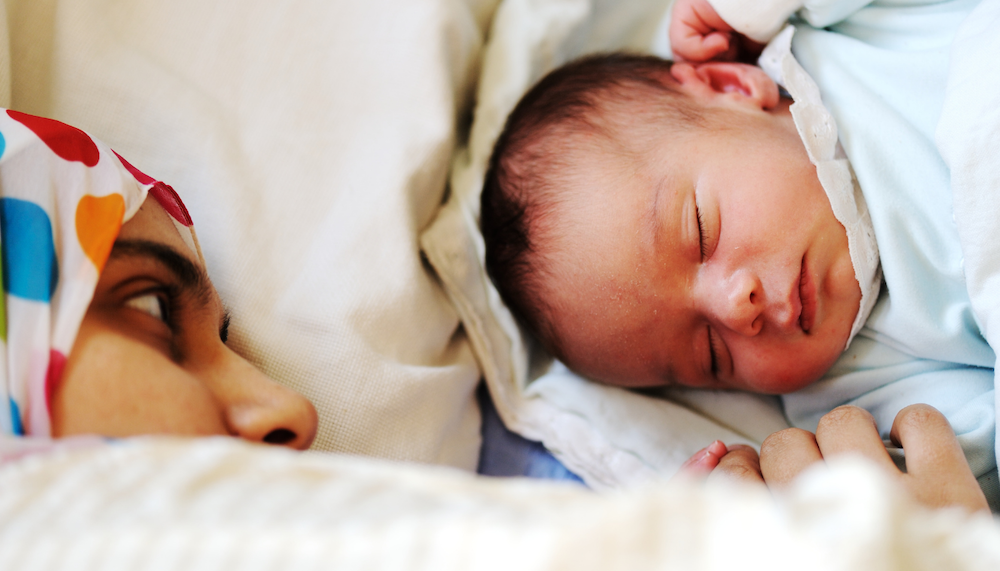Sleep Training Your Baby Can Help You Sleep Better, Too
Hands up if you’re a new mother wishing you could get better sleep? If you’re too tired to raise your hands, we see you too, mama. Good sleep and the early days of parenting don’t often go hand-in-hand, but there are always things you can do to support the health of your sleep. Your dietary patterns, exercise schedule, and even what your bedroom is like can influence your sleep.
But let’s be honest, as a new parent, the number one thing disrupting your sleep cycles right now is that precious little baby that’s on a very different sleep schedule from you. The good news is, sleep training can make a huge difference. We spoke to the lovely Rebecca Hill, a certified Sleep Sense™ consultant, on what you need to know about sleep training, and how it can support both you and your baby at this time.
What is the main role of a newborn sleep coach?
Rebecca Hill: When new parents learn that newborn sleep patterns can be all over the place, the prospect of sleepless nights usually invokes a lot of fear and anxiety.
As a Sleep Coach, my role is to alleviate that anxiety and to help parents understand their babies’ sleep, so they can lay down some great healthy foundations. At Sleepytime we are passionate about helping parents to feel empowered and confident around their babies’ sleep and we work with newborns right up to the age of 7 years along with adults too. We create personalised plans and work closely with families to help them all sleep well using gentle and responsive techniques.
When can you start sleep training?
With newborns, we are unfortunately unable to sleep train them until they are around 4 months of age. This is because of their underdeveloped circadian rhythm and also because it is very normal for them to want to be close to their parents as they transition into this world. The fourth trimester is a term commonly used to describe this.
However, it’s never too early to make some small steps towards those healthy sleep patterns, so when your baby IS ready to sleep through, then they’ll find it much easier to do so if they can self-settle.
What is newborn sleep like in the first 4 months?
It’s fair to say that your baby's sleep patterns will be all over the place for the first few weeks. This is the case as your little one starts to develop their internal body clock; however, at around 7-8 weeks you may start to see some lengthening, usually for the first stretch of the night. All babies will develop at different rates so it’s important not to try to compare yourself to others.
What nighttime routines should parents try for newborn sleep?
Starting with a relaxing bedtime routine is one of the best steps you can take towards helping baby recognise that it’s nighttime, so introducing a bath when you feel ready to, some massage, songs, and stories then offering a feed is a good place to start.
Keeping night times calm and low lit, with minimal stimulation for baby; then daylight bustling and bright is also helpful in establishing baby's body clock.
What daytime routines should parents try for newborn sleep?
In terms of daytime routine, it's really important firstly that you have established good feeding, but when you are ready to, you could introduce a pattern of feed, play, sleep to encourage baby not to associate feeding with sleeping. Newborns need a huge amount of sleep and can get overtired and overstimulated very quickly. The younger your baby is, the more sleep they'll need. Good daytime sleep is just as important as night sleep.
There is a common misconception that we should keep babies going during the day and therefore they'll sleep better at night, but this is the worst thing you can do as trying to settle an overtired baby can be very challenging. Therefore it's so important that you don't try to keep them going for any longer than 45-60 minutes. Some babies will show you sleep cues such as staring into space, grizzling or fussing, rubbing eyes, yawning, or jerky movements. However, these can be difficult to read sometimes so it’s best to aim for no more than an hour awake before offering your baby a nap.
Is the 4-month sleep “regression” a real thing?
Around 4 months of age, the structure of your babi’s sleep will be maturing into one like an adult, whereby they move from having 2 phases to their sleep cycles (deep and REM sleep) to having lighter sleep being introduced. This is a true “progression” rather than a “regression” however, because they now have this lighter sleep, they are more easily woken.
This process usually affects sleep for anywhere from 2-6 weeks, and the best way to get through this is to help your baby learn to self-settle. If you haven't been laying down those little foundations then you may find that you are struggling and baby’s sleep feels like it is worse than ever. It is therefore around this age we help with more formal sleep training. The majority of our clients come for support with how to teach their baby to self-settle.
When can you expect your baby to sleep through the night?
The majority of babies will be doing longer stretches of sleep from 3-4 months and are able to sleep through the night from around 6 months of age. Again, there can be some variation in this depending on lots of factors such as hunger, sleep environment, and developmental milestones.
The best thing you can do is to slowly and gently work on self-settling your baby, so try to put them down sleepy but not in a deep sleep so they start to develop the ability to fall asleep independently. Remember it takes time and practice and it won't always work, to begin with. Don't let that put you off from trying again though another day and one day, your baby might surprise you and it falls into place.
Will feeding baby solids help them sleep through the night?
You may hear parents suggesting you should feed baby solids early to help them sleep through, but this is a myth and in fact, could upset your babies digestion making them more susceptible to waking from discomfort.
Thank you so much for your time! Any final thoughts?
Know that this is just a short season of your babi’s life. It gets easier with time and if you take those small steps to help baby with self-settling, you'll be able to enjoy parenting and see your baby happy and sleeping well.
This post was created in collaboration with Rebecca Hill
Rebecca Hill is a Sleep Sense™ consultant, founder of Sleepytime Sleep Solution, and a mother to a young son herself. For more one to one support with newborn sleep, you can visit www.sleepytimesleep.com for details of her Newborn Sleep Guides, Online Courses and bespoke 1-2-1 packages, and you can follow her on Facebook and Instagram @sleepytimesleep.


